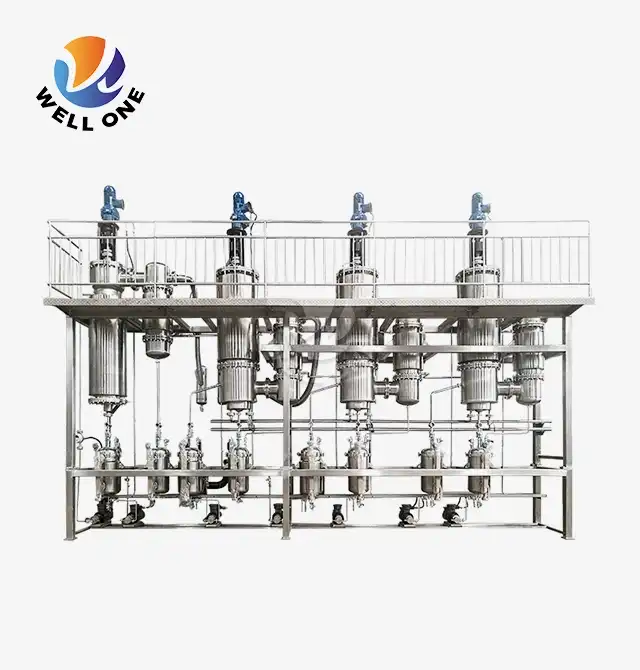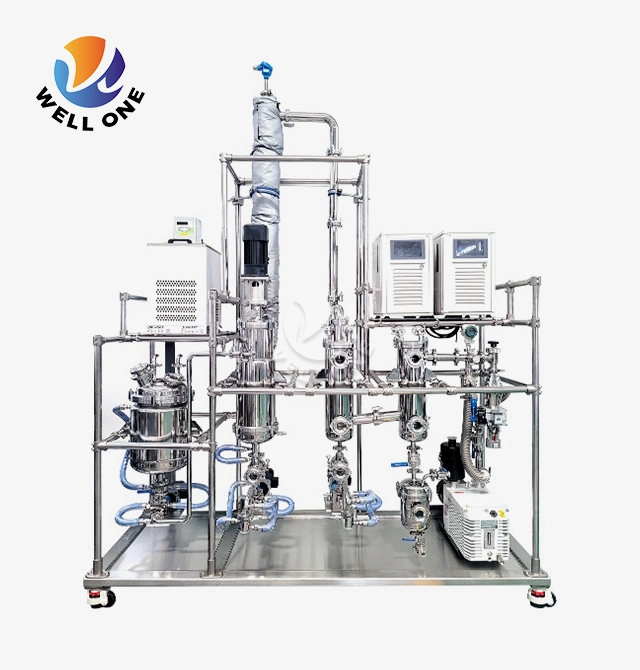Molecular distillation - Lab Instrument Manufacturer
Are you struggling with thermal degradation when purifying heat-sensitive compounds in your laboratory? Traditional distillation methods often expose valuable materials to excessive heat, resulting in product loss, compromised purity, and wasted resources. Laboratory Molecular Distillation offers a revolutionary solution for researchers and manufacturers who demand precision separation without thermal damage. This advanced technology operates under ultra-high vacuum conditions, enabling separation at temperatures far below conventional boiling points, making it indispensable for pharmaceutical, food, and chemical industries worldwide.
Understanding Laboratory Molecular Distillation Technology
Laboratory Molecular Distillation represents a paradigm shift in separation science, designed specifically for compounds that cannot withstand traditional distillation temperatures. Unlike conventional methods that rely on vapor-liquid equilibrium, this technology exploits the difference in molecular mean free paths, allowing molecules to evaporate and condense over extremely short distances—typically just a few centimeters. This unique mechanism occurs under vacuum levels reaching 0.1 Pa or lower, minimizing thermal exposure and preserving the integrity of sensitive molecules such as vitamins, essential oils, pharmaceutical intermediates, and polyunsaturated fatty acids.
Working Principles of Laboratory Molecular Distillation Systems
The fundamental principle behind Laboratory Molecular Distillation involves creating conditions where the mean free path of molecules exceeds the distance between the evaporating and condensing surfaces. When feed material enters the heated evaporator surface, lighter molecules with higher vapor pressures evaporate first and travel directly to the cooled condenser without collisions with other molecules. This collision-free environment prevents degradation and enables separation based purely on molecular weight differences rather than boiling point variations. Modern systems incorporate precision-engineered wipers that continuously spread thin films across the heated surface, ensuring maximum evaporation efficiency while preventing hotspots that could damage temperature-sensitive compounds.
Key Components and Configuration Options
Professional Laboratory Molecular Distillation equipment comprises several critical components working in harmony. The evaporator section features 316 stainless steel construction for corrosion resistance and compatibility with pharmaceutical-grade materials. Internal wipers, driven by precision motors, maintain optimal film thickness across the heated surface. The condensation system employs dual or triple cooling zones with independent temperature control, allowing simultaneous collection of multiple fractions. Advanced control systems, typically ABB PLC-based platforms, provide real-time monitoring of temperature, vacuum pressure, feed rate, and product collection, ensuring reproducible results across batches. Configuration flexibility allows researchers to choose between single-stage systems for straightforward separations or multi-stage cascades (dual stage, three stage) for complex purification challenges requiring sequential separation steps.
Applications Across Pharmaceutical and Food Industries
Laboratory Molecular Distillation has become indispensable across diverse industries where product purity and thermal stability are paramount. The pharmaceutical sector relies heavily on this technology for purifying active pharmaceutical ingredients, isolating lipid nanoparticles, and concentrating bioactive compounds without degradation. Food manufacturers utilize Laboratory Molecular Distillation for refining fish oils rich in omega-3 fatty acids, achieving EPA and DHA concentrations exceeding 80% while maintaining nutritional integrity. The technology proves equally valuable for deacidifying specialty oils like camellia seed oil, removing free fatty acids that compromise shelf life and nutritional value.
Pharmaceutical Industry Applications
In pharmaceutical manufacturing, Laboratory Molecular Distillation addresses critical purification challenges for compounds sensitive to heat and oxidation. Polyethylene glycol synthesis benefits tremendously from molecular distillation's ability to produce narrow molecular weight distributions essential for pharmaceutical excipients. The technology enables manufacturers to achieve dispersity indices below 1.05 while eliminating unwanted oligomers and impurities. Squalene purification represents another success story, where multi-stage Laboratory Molecular Distillation systems remove fatty acid esters and achieve purity levels reaching 98%, meeting stringent pharmaceutical and cosmetic industry standards. The gentle separation conditions preserve bioactive properties critical for therapeutic efficacy.
Food Industry Purification Solutions
The food industry presents unique challenges requiring both high purity and preservation of nutritional properties. Laboratory Molecular Distillation excels at purifying fish oil ethyl esters, where traditional methods struggle to separate EPA and DHA from similar unsaturated fatty acids. By operating at reduced temperatures and high vacuum, molecular distillation achieves recovery rates of 70%—dramatically superior to conventional methods yielding only 16%. The resulting products exhibit excellent color, minimal fishy odor, low peroxide values, and customizable EPA-to-DHA ratios. Tea oil deacidification similarly benefits from this technology, removing free fatty acids without damaging antioxidants and bioactive compounds, producing premium edible oils promoted by international food organizations.
Technical Specifications and Quality Standards
Modern Laboratory Molecular Distillation systems incorporate sophisticated engineering to deliver reliable, reproducible results meeting international quality standards. Equipment certified with CE, ISO 9001, UL, and SGS certifications ensures compliance with global safety and performance benchmarks. Technical specifications reflect the demanding requirements of modern research and production environments, with temperature control ranging from 50°C to 300°C adjustable to specific material characteristics. Vacuum systems achieve levels below 0.001 mbar, minimizing thermal stress on sensitive compounds. Evaporation surfaces spanning 0.1 to 2 square meters accommodate both laboratory-scale research and pilot production requirements.
Advanced Control Systems and Automation
Contemporary Laboratory Molecular Distillation equipment features ABB control systems providing exceptional precision and reproducibility. These automated platforms enable researchers to program complex distillation protocols with temperature accuracy within ±0.1%, ensuring consistent results across multiple production runs. Real-time data logging capabilities track critical process parameters including vacuum pressure, feed rates, and condenser temperatures, facilitating process optimization and regulatory compliance documentation. The integration of automated controls reduces operator intervention while improving safety through continuous monitoring of system conditions and automatic shutdown protocols when parameters deviate from preset ranges.
Material Construction and Compliance
Equipment construction materials directly impact product purity and system longevity. Laboratory Molecular Distillation systems manufactured with 316L stainless steel offer superior corrosion resistance essential for handling aggressive chemicals, acidic compounds, and food-grade applications. This pharmaceutical-grade material complies with GMP requirements and FDA 21 CFR Part 11 standards, ensuring suitability for regulated industries. Surface finishes meet stringent specifications for cleanability and prevention of product contamination. All wetted surfaces undergo electropolishing to achieve mirror-like finishes that facilitate cleaning-in-place (CIP) and sterilization-in-place (SIP) procedures required in pharmaceutical production environments.
Customization and Scale-Up Capabilities
One significant advantage of working with experienced Laboratory Molecular Distillation manufacturers involves access to comprehensive customization services. OEM and ODM support enables researchers to specify exact configurations matching their unique process requirements. Custom designs incorporate 3D animation modeling, allowing clients to visualize equipment integration within existing facilities before manufacturing begins. Modular system architectures facilitate seamless scale-up from benchtop research units processing small sample volumes to industrial-scale production systems handling thousands of kilograms daily, maintaining process consistency throughout scaling operations.
From Laboratory Research to Industrial Production
The transition from laboratory development to commercial production presents significant challenges in maintaining process performance and product quality. Laboratory Molecular Distillation technology addresses these concerns through scalable design principles ensuring that separation efficiency, thermal exposure, and product recovery rates remain consistent across equipment sizes. Pilot-scale systems bridge the gap between research and production, enabling process validation and optimization at intermediate capacities before committing to full-scale manufacturing investments. Experienced manufacturers provide comprehensive technical support throughout scale-up activities, including process development services, equipment design consultations, feasibility studies, and on-site commissioning assistance.
Conclusion
Laboratory Molecular Distillation technology delivers unmatched capabilities for separating heat-sensitive compounds across pharmaceutical, food, petrochemical, and specialty chemical industries. Its gentle operation preserves product integrity while achieving exceptional purity levels impossible with conventional distillation methods.
Cooperate with Xi'an Well One Chemical Technology Co., Ltd
Since 2006, Xi'an Well One Chemical Technology Co., Ltd., backed by Xi'an NewSet Chemical Equipment Technology Co., Ltd., has specialized in synthesis and purification separation equipment. With a 1500 m² office, 500 m² R&D laboratory, and 4500 m² manufacturing facility, the company delivers comprehensive solutions from process development through industrial-scale production. Their expert design team creates customized Laboratory Molecular Distillation systems ranging from experimental thin film distillation to multi-stage continuous industrial units.
As a leading China Laboratory Molecular Distillation manufacturer, China Laboratory Molecular Distillation supplier, and China Laboratory Molecular Distillation factory, Well One provides premium quality equipment with selected materials ensuring top-grade products. Their China Laboratory Molecular Distillation wholesale options include High Quality Laboratory Molecular Distillation systems with competitive Laboratory Molecular Distillation price points. All Laboratory Molecular Distillation for sale feature UL, CE, ISO, and SGS certifications, 316 stainless steel construction, ABB control systems, and one-year warranties. Contact info@welloneupe.com today for customized solutions addressing your specific separation challenges and discover why global leaders trust Well One for their molecular distillation requirements.
References
1. Perry, R.H., Green, D.W., and Maloney, J.O. "Perry's Chemical Engineers' Handbook, Eighth Edition" - Section on Distillation and Gas Absorption Technologies, McGraw-Hill Professional.
2. Batistella, C.B. and Maciel, M.R.W. "Molecular Distillation: Rigorous Modeling and Simulation for Design and Operation Purposes" - Applied Biochemistry and Biotechnology Journal.
3. Cvengros, J. and Lutisan, J. "Mean Free Path of Molecules on Molecular Distillation" - Chemical Engineering Journal and Processing: Process Intensification.
4. Martini, S., Solbiati, J., and Añón, M.C. "Molecular Distillation of Vegetable Oils: Separation and Characterization Studies" - Journal of the American Oil Chemists' Society.







